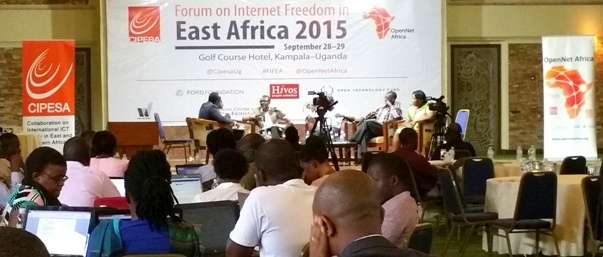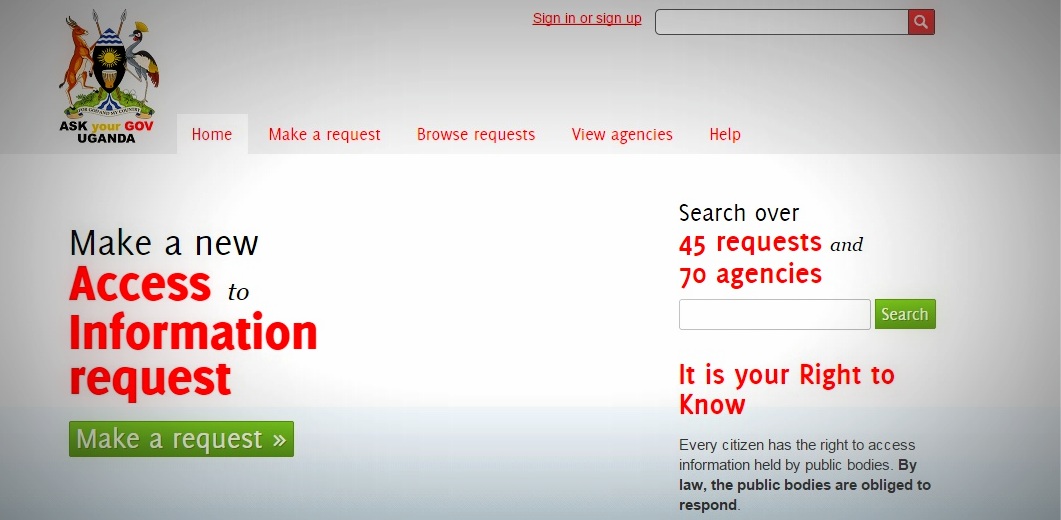By Juliet Nanfuka |
The recently concluded two-day Forum on Internet Freedom in East Africa 2015 sparked debate on the many facets of internet freedom, including access to information, digital safety, media freedom, online violence against women, regulation of the internet, freedom of expression online, and the online economy.
The first day of the Forum coincided with the internationally celebrated Right to Know Day (September 28) and also served as a platform to recognise the tenth anniversary of the Access to Information Act in the host country, Uganda.
The Forum, organised by the Collaboration on International ICT Policy for East and Southern Africa (CIPESA) under the OpenNet Africa initiative, brought together just under 200 participants, a dramatic increment from the 85 who participated at last year’s inaugural Forum. Participants represented a wide spectrum of stakeholders including communications regulators, civil society, intermediaries, private sector, tech enthusiasts, artists, media and ordinary citizens. It was supported by the African Centre for Media Excellence (ACME), Hivos, Ford Foundation, Open Technology Fund, UNESCO and Web We Want.
According to the ITU, there are currently 3.2 billion people using the internet of which, by end 2015, two billion will come from developing countries. There is therefore a need to create awareness and to advocate for internet rights in developing countries that are registering a dramatic uptake of the internet.
The African Declaration on Human Rights has set the foundation upon which human rights standards and principles of openness in internet policy formulation can be developed in Africa. While various policies and laws have been developed in the continent’s 54 countries, many contradict the rights to privacy, access to information, data security, and freedom of expression.
In his opening remarks at the Forum, Jaco du Toit, Communication and Information Adviser at the UNESCO Regional Office for Eastern Africa, pointed to growing concerns over the mechanisms used by governments in the region to monitor citizen’s activities both online and offline. These concerns threaten legitimate online interactions including by the media that plays the role of society’s watchdog, and by critical citizens with large online footprints and human rights organisations that rely on information to encourage civic participation and good governance.
The use of ICT tools by citizens to exercise their right to free expression and as an engine for development is widely recognised especially as the push for open data gains momentum across the African continent. However, recognition of internet rights in the same breath as the rights guaranteed offline by national constitution remains a grey area.
Internet Freedom in East Africa
The forum served as the launch of the State of Internet Freedom in East Africa 2015 report on access, privacy and security online in Burundi, Kenya, Rwanda, Tanzania, and Uganda. The report is the result of qualitative and quantitative research conducted in the focus countries between May 2014 and August 2015.
The report highlights legal developments related to internet freedom in each of the focus countries such as the May 2015 ruling by the East African Court of Justice (EACJ) against the Burundi Press Law of 2013, on the grounds that some sections went against the principles of press freedom. This marked a victory for the Burundi Journalists Union who had petitioned the court over the repressive law. In Kenya, the Security Laws (Amendment) Act was signed into law despite concerns over its expansion of the surveillance capabilities of the Kenyan intelligence and law enforcement agencies.
In Tanzania, the controversial Cybercrimes Act and the Statistics Act were both passed in 2015 notwithstanding protests due to the restrictions they place on advancing transparency and access to information.
Progressive public access developments are also reported such as the Smart Kigali initiative which provides wireless internet service on select public transport buses. The Ministry of ICT in Rwanda also launched the “Stay Safe Online” campaign aimed at promoting awareness on cyber security.
The report also presents some of the violations of internet freedom that were registered in East Africa over the last year.
Knowledge, Attitudes and Perceptions on Internet Freedom
The report found that understanding of what constitutes internet freedom among the region’s citizens is varied. The majority associated internet freedom with the ability to utilise the internet free of unwarranted state regulations or commercial restrictions.
Online safety practice was low with only 48% of the respondents using digital safety and security tools to safeguard themselves online. A lack of awareness of security risks on digital platforms and shortage of skills to secure communications were among the reasons for not actively utilising online safety tools.
The report further found widespread perception among East Africans of government surveillance even where there was limited evidence remain prevalent of actual surveillance. Respondents cited national security, countering terrorism, and combating hate speech as key reasons for government surveillance.
Discussion Echoes Report Findings
Discussions in the 13 sessions at the forum repeatedly pointed out contradictory or non-existent laws to protect users especially in instances where critical content in writing, or creative and performing arts have led to arrests. This in turn has contributed to self-censorship by independent content producers and media.
Further, victims of online violence against women (VAW) do not have any legal structures to ensure their rights are upheld; instead, many are castigated more than the perpetrators of the violence. Limited legal provisions on the vice have thus led to a culture of silence and misinformation which in turn impacts upon reporting of cases to indicate the extent and actual statistics of VAW in African countries.
Discussions at the forum echoed insights gathered in the report, including the friction between control of content which impacts upon freedom of expression and regulation of the internet so as to combat hate speech and terrorism, and to maintain national security and public order.
“Ignorance of the law is not an excuse,” said Irene Kaggwa, Head of Research and Development at the Uganda Communication Commission on the need for responsible use of the internet. Jimmy Haguma, Acting Commissioner with Uganda Police’s Cybercrimes unit, , added that “freedom without control” would contradict certain needs, such as ensuring child online safety and protection from theft and fraud.
The challenges involved with ensuring that the internet is a safe space for genuine interaction were summarised by Facebook’s head of Public Policy for Africa, Ebele Okobi, who noted that “If Facebook were a country, it would be the biggest country in the world.” She added that the global platform faces a challenge of how to apply the laws of every country in which it has users in its policy on online content.
Underpinning all discussions at the forum was the use of social media and the need for users to build their digital security capacities as the online arena increasingly becomes the key avenue for social interaction. However, legislation in many countries has not moved fast enough to ensure the protection of users who fall victim to online abuse and violence.
In his closing remarks, Vincent Bagiire, Chair of the ICT Committee, Parliament of Uganda, emphasised the necessity for further engagement on internet freedom not only by civil society but with a more inclusive multi-stakeholder approach which works towards ensuring a free and open internet. He stated that this responsibility exists first at the national level, “but given the borderless, global nature of the internet”, it is also very much a global issue. “Internet freedom is both a domestic and a foreign policy subject,” he said.
The Forum had representation from 19 countries including Burundi, Cameroon, Democratic Republic of Congo, Ethiopia, Germany, Italy, Kenya, Nigeria, Rwanda, Tanzania, South Africa, South Sudan, Sudan, Somalia, Uganda, United Kingdom, United States of America, Zambia, Zimbabwe
For more details, visit the Forum on Internet Freedom in East Africa 2015 page, See the full programme and the speaker biographies.
The Challenge of Tackling Online Violence Against Women in Africa
By Evelyn Lirri |
The story of a 19-year-old student from Kenya who committed suicide after a man she met through Facebook threatened to publish her nude photos came to the limelight on the heels of the opening day of the Forum on Internet Freedom in East Africa, which took place in Kampala, Uganda.
The forum, organised by the Collaboration on International ICT Policy for East and Southern Africa (CIPESA), under the OpenNet Africa Initiative, drew a cross-section of people from Africa and beyond, including human rights defenders, academics, , law enforcement officers, communication regulators, media, and the tech community to debate issues impacting online freedom of expression and cyber security in Africa. The emerging issue of online violence against women (VAW), a growing problem worldwide, was among the key topics discussed.
Panelists at the Forum said cyber violence against women exists in several forms, including stalking, sexual harassment, surveillance, revenge pornography, public shaming and use of images or videos to manipulate individuals. It is particularly carried out through email, social media such as Facebook, Twitter and mobile phone instant messaging platforms like WhatsApp.
Ruth Nsibirano, a gender expert from Makerere University, said it is difficult to quantify the extent of cyber VAW in Africa because of several inhibitions including the culture of silence.
“In many cases when women report this kind of violence, they are blamed for causing it and so they end up keeping quiet instead of speaking out,” explained Dr. Nsibirano. She added that many women were reluctant to report their tormentors because of the fear of reprisal and, in other cases, they did not know where to seek redress.
According to Jan Moolman, a feminist activist with the Association for Progressive Communications (APC) who was on the panel that discussed gender-based online violence, women’s access to the internet and technology remains low, especially in developing countries, leaving the conversation on internet rights to be dominated by men. She noted that in some African countries, online VAW was targeted at public figures, largely because of the nature of their work.
“We need policies and legislation by governments to say this kind of behaviour online is unacceptable. Just like we are responding to violence against women offline, we need to do the same online,” said Ms. Moolman.
Despite the ongoing reports of harassment and intimidation, Ms. Moolman urged more women and girls to join online spaces in order to be part of the conversation against the vice and how to ensure they are safe when they use different online platforms.
Nanjira Sambuli, a research manager with iHub Kenya, said cases of violence against women are usually difficult to prosecute because the evidence is hard to present.
“The cases that come to the limelight are likely a representative of what we don’t hear or see. We need to work towards frameworks that allow people to report anonymously. That way, we shall have a better sense of what is happening,” she said.
Ms. Sambuli highlighted the fact that efforts to combat violence against women have thus far been mainly offline, with fewer strategies put in place to document the harm that happens online and ensure women know where to seek help when they have been violated.
“The internet especially social media platforms are spaces where people are beginning to negotiate and understand what it means to have freedom and what the boundaries are. The internet should be a space where citizens can engage, learn and build a better society,” she added.
Among the possible efforts to curb the vice, Dr. Nsibirano called for increased education of women on the dynamics of the internet through school curriculums. “That way, we shall get more women who will be knowledgeable when these crimes happen,” she said.
Many countries across Africa do not have specific laws under which offenders can be prosecuted. In Uganda, some offenders have been charged under the Anti Pornography Act, 2014, but participants noted that this law was not sufficient to address the problem given that the same law could be used to prosecute the victims.
“Digital evidence is an area that the world is still trying to figure out,” noted Ms. Sambuli. She stressed the need for laws not to aggravate the infringement of victims’ privacy during investigations and prosecution of VAW crimes.
OpenNet Africa Project Introduction Meetup
Since 2013, the Collaboration on International ICT Policy for East and Southern Africa (CIPESA) has been coordinating the OpenNet Africa projectwhich is aimed at monitoring and promoting internet freedoms, primarily in East and Southern African states.
As part of the initiative’s 2015 strategies, Outbox community has been chosen to undertake certain in-country activities.
To this end, on Thursday 16th April, 2015, from 5:00 PM to 7:00 PM, a team from CIPESA will meet-up with selected techies with knowledge of Internet usage and security, to share about what OpenNet Africa is, what objectives we want the techies to test, what to test and what success would look like after the test.
Tools to be used:
- Cryptocat
- Mailvelope
- Martus
- Textsecure
- Redphone
All these tools are open source and should be easily available online.
Participants will be supported for 3 weeks to work on their ideas with support from mentors after which there will be a pitching event to showcase the test/familiarisation findings and localisation ideas to adapt/ improve the tools.
Judges will determine participants with the best findings and localisation ideas for prizes.
If you would like to participate, please apply here and wait for confirmation email.
OpenNet Africa is aimed at monitoring and promoting internet freedoms, primarily in East and Southern African states.
The objective is to provide a centralised platform that acts as a focal point for information on African internet freedoms and cyber security. OpenNet Africa therefore provide access to research materials on internet freedom, legal regimes on internet openness or the lack of it, censorship incidents, African initiatives that are promoting internet rights, and policy advocacy materials. Learn more…
Uganda Gov’t Officials Trained in Using Right to Information Portal
By Ashnah Kalemera
On November 7, officials from 40 Uganda Government Ministries, Departments and Agencies (MDA) were trained in promoting citizens’ right to information, including through the use of the Ask Your Government portal.
Launched on August 14, 2014, www.askyourgov.ug allows Ugandan citizens to directly send requests for information to information officers in Government MDAs. Responses to the requests are relayed directly to the email address of the person who makes the requests and are also publicly displayed on the portal. In accordance with Uganda’s Access to Information Act of 2005, the portal promotes citizens’ right to information in support of transparency, accountability and good governance.
The dialogue aimed to increase the number of information officers registered on the portal and encourage the officers to respond to information requests within 21 days as required by the law.

Currently there are 70 MDAs registered on the AskYourGov portal and so far 45 requests for information have been logged through the portal, of which 20 have received responses. Only 8 of the 20 responses have been classified as successful by requesters.
In an effort to encourage the Officers to improve the response rate, Sylvia Biraahwa, the Principal Information Officer, Directorate of Information and National Guidance, Office of the Prime Minister (OPM), urged officials to adopt internal practices that promote transparency and accountability without waiting for directives to be handed down from the central government. Ms. Biraahwa commended the Lands Ministry for taking positive steps in information disclosure by developing an access to information manual, setting a great example for other MDAs to follow suit.
However, one official argued that the best way to motivate information officers to respond to right of information requests was through a top-down approach. “OPM and the Directorate of Information should demand that there be sections in annual Ministerial Policy statements regarding what has been done and achieved in the area of ATI [access to information],” he said. This would “motivate and give support” to low-ranking officers to act in compliance with the law.
The dialogue, which was organised by the OPM in partnership with CIPESA and the Africa Freedom of Information Centre (AFIC) also sought to sensitise officials in emerging media platforms for increased openness and citizen engagement. Ms. Juliet Nanfuka Nakiyini of CIPESA said cabinet, in May 2013 directed the Ministry of Information and Communications Technology (ICT) to ensure that every MDA opens a Twitter and Facebook account to improve communication with the public. This directive, together with the Websites and Social Media standards and guidelines developed by the National Information Technology Authority (NITA), provided immense opportunities for attracting more citizens into the democratic process and building accessible information repositories.
Ms. Nanfuka urged officials to exploit the push and pull symbiotic relationship that can exist between government and citizens through askyourgov.ug and MDAs’ social media platforms. For instance, they could initiate discussion topics on Facebook and Twitter on readily available information and invite discussants to send requests through the AYG website for information to inform the debate. She encouraged the MDAs to share on their websites and social media platforms the queries they receive via AskYourGov and the responses they provide.
Simon Mayende, the Director of Information and National Guidance, urged the participating MDAs to also utilise Public Education Programmes in print and broadcast media spaces for citizens sensitisation on RTI as provided for under the government communications strategy.
Mr. Mayende said the Uganda Law Reform Commission was working to identify laws with provisions that contradict the access to information law so as to draft progressive amendments for tabling before parliament.
Read more about the day’s activities here. Visit the portal on www.askyourgov.ug to register and make information requests. See also the Ask Your Government Uganda User Guide and Information Sheet.
Follow requests and responses on social media:
Facebook: www.facebook.com/askyourgovug
Twitter: @AskYourGovUg
Online Privacy and Security: The Debate And The Dilemma
By Ashnah Kalemera
The issue of internet users’ privacy and security has been widely debated since the Edward Snowden revelations last June put a magnifying glass on the extremes that some governments, such as the U.S., are prepared to go to in the fight against terrorism and cybercrime.
To-date, debate rages on amongst human rights activists, government, media, academia and the private sector on the effects of surveillance on internet freedoms. It is also becoming apparent that some developing countries are also taking to surveillance of their citizens’ communications.
These discussions continued at this year’s Stockholm Internet Forum (SIF), themed “Internet: privacy, transparency, surveillance and control”. The annual forum hosted by the Swedish Ministry for Foreign Affairs in partnership with the country’s Internet Infrastructure Foundation (.se) and the Swedish Development Cooperation Agency (Sida), took place in Stockholm, Sweden, May 27–28, 2014.
In her opening address, Anna-Karin Hatt, Sweden’s Minister for Information Technology, said there would be grave consequences to basic human rights if states across the world continued to undertake unrestricted surveillance.
“During the last year, we have had more than one reason to discuss the behaviour between states and the behaviour of states within their borders,” she said. “The most valuable lesson has been that all surveillance must be subjected to strict limitations.” She added that “no system of surveillance must be justified because it is technologically possible.”
Rather, where legitimate cause exists, “surveillance must be proportional to the benefits it brings to citizens in terms of reduction in crime and improved security”. Furthermore, she argued, it must be based on transparent laws that are adopted through democratic processes.
She also noted that the last year had seen many multi-stakeholder meetings and processes on the matter. These included the 2013 global Internet Governance Forum, NetMundial, the Freedom Online Coalition, and the 2014 Cyber Dialogue. However, she added, it was still important to continue these discussions with participation from a broad range of state and non-state stakeholders in order to reach a consensus.
According to the International Telecommunications Union (ITU), only 19% of Africans use the internet compared to 75% (Europe), 32% (Asia) and 65% (the Americas). Africa also has the lowest mobile phone penetration rates. Low literacy levels, high cost of accessing and owning ICT, acute shortages of electricity, gender inequalities and a shortage of skilled human resources have contributed to the continent’s low ICT use. Even with this limited access, internet use is further impeded by government policies and practices that threaten internet freedom.
While African governments may not be blatantly or capably conducting surveillance on the scale of the National Security Agency (NSA) in the U.S., in recent years they have not shied away from requesting for social media users’ information and seeking content take downs. This is a reflection of the growing interest in what citizens are doing online.
According to the recently published State of Internet Freedom in East Africa report, national constitutions and a number of legislations on the continent provide for freedoms of expression, assembly, privacy and access to information. However, various recently enacted laws take away from citizens’ enjoyment of these freedoms in the online space.
James A. Lewis, director and senior fellow at the American Centre for Strategic and International Studies, asserted that post-Snowden, the debate had shifted from freedom of expression to privacy versus security. The latter were not guaranteed on the internet. “I have never seen a government that does not conduct surveillance on its own citizens. The challenge is extending sovereignty without sacrificing human rights,” he said.
But what is the perception in the developing world where it is estimated that the next billion internet users will come from? Should Africa prioritise access over security? Alison Gillwald, executive director of Research ICT Africa, noted that many people on the continent are more concerned about getting access to the internet and less so their privacy online.
Meanwhile, emerging threats from terrorist and militia groups in Africa seem to have influenced the way some governments perceive internet freedom. In Nigeria, Gbenga Sesan noted that the abduction of 300 schoolgirls by a Muslim extremist group had re-enforced state surveillances measures. “The government is using such incidents to justify ‘rule of law’: ‘if we should provide you with more security, we need to access your privacy’,” said Mr. Sesan.
Perhaps, as Eileen Donahue, Director of Global Affairs at Human Rights Watch pointed out, even with continued discussion and research on the matter, “we may not be able to figure out how to proactively reconcile the internet and human rights.”





